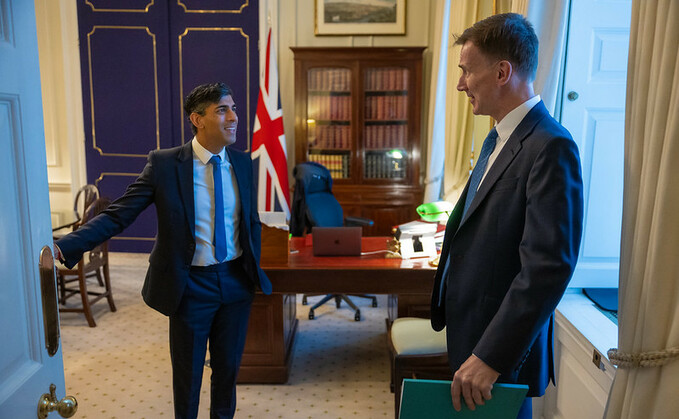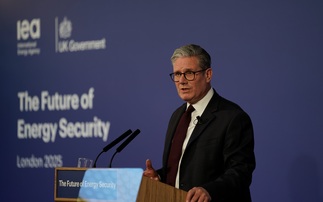
Credit: Simon Walker / No 10 Downing Street
Hunt's flurry of green reforms in the Autumn Statement are welcome, yet still dangerously underpowered
After the chaos of last autumn, Jeremy Hunt delivered a return to form with the kind of Autumn Statement that would have felt remarkably familiar to students of the Osborne-Hammond years.
Pre-election tax cuts? Check. Benefits crackdowns? Check. Odes to fiscal responsibility? Check. A paean to high growth industries? Check. A stubborn refusal to take any responsibility for flat-lining growth and a selective blindness towards collapsing public services? Check.
The approach to the green economy followed a similar tried and not so trusted template. It amounted to an attempt to triangulate our way out of the climate crisis.
Hunt kicked off by bragging about the government's promise to keep drilling in the North Sea. He then attacked Labour's plans to borrow to invest £28bn in green infrastructure by quoting late climate sceptic Lord Lawson on the burden such debt places on future generations. It remains to be seen whether the future residents of Cambridge-on-Sea will thank Hunt for his prudence. The continuation of the fuel duty freeze was so taken as read that Hunt failed to even mention it.
But then he proceeded to quietly stress the importance of the green economy to the UK's economic prospects. There were planning reforms and the promise of much faster grid connections for clean energy projects. There was £4.5bn of government support for high growth manufacturing industries with electric vehicles and clean tech to the fore. Most importantly there was confirmation that full expensing of capital allowances is to be made permanent - a huge tax break for businesses that will disproportionately benefit the net zero transition. From clean energy mega projects to single building energy efficiency upgrades, full expensing will make a tangible difference to the investment case for a raft of emissions reduction projects.
This is all good stuff and it would be churlish to be overly critical. The attacks on the net zero transition from a scattergun Number 10 appear to have been shelved and Hunt has returned to a pragmatic package of reforms that should help drive fresh investment in a host of critical decarbonisation projects. Green business groups will be privately pleased to see the consensus on the importance of planning reforms, grid connections, and net zero investment gently reasserted.
And yet, as Beverly Cornaby at the UK Corporate Leaders Group argued, it is hard not to see the Autumn Statement as anything other than "another missed opportunity".
Throughout Hunt's address to Parliament his repeated insistence that the UK's economic performance is something to brag about appeared completely detached from reality. The most recent growth figures stood at zero per cent, inflation is still at 4.6 per cent, the Office for Budget Responsibility has just cut its medium term growth forecasts to 1.6 per cent. Meanwhile, the imminent COP28 Climate Summit - a meeting that represents an increasingly desperate attempt to avert 3C of warming this century - did not even get a cursory mention. Climate crisis? What climate crisis?
Against such a backdrop, Hunt's welcome green reforms looked dangerously underpowered. A fiscal peashooter when set against the subsidy arsenal unleashed by the US Inflation Reduction Act.
The promise of £4.5bn of funding to support advanced manufacturing is a case in point. Hunt promised it would "ensure the UK remains competitive in sectors where we're already leaders and innovative in sectors where we're not". But will it?
£4.5bn sounds like a big number, but the funding will not come into effect until 2025, will be spread over an entire five year Parliament, and is less than half what the government intends to give away each year through its business tax breaks.
It is also unclear whether it is even close to being sufficient. The government is always loath to confirm how much financial support it provides to secure new industrial investment, but the support package that convinced Tata to sign off on a single gigafactory was rumoured to be worth £800m, the funding to help British Steel decarbonise was said to total £500m, and BMW's plans to build its electric Mini in Oxford reportedly required the government to stump up £75m. These are all strategically critical investments, but globally competitive supply chains do not come cheap - £4.5bn will not go far.
As Steve Coulter, head of economy at Green Alliance, observed: "The Chancellor splashed £20bn on tax cuts in today's Autumn Statement, but promised pocket change to the job-creating green industries of the future - and he plans to reduce productivity-boosting capital spending in the coming years... while the UK promises to invest in key green industries from 2025 onwards, the US has started work on hundreds of clean manufacturing projects. We need bolder plans and concrete commitments to green growth, or we'll lose out."
More broadly the Autumn Statement contained nothing on nature, climate resilience, or energy efficiency. There was little on skills, corporate governance, or the need for a just transition. There was nothing that could reasonably be characterised as a credible response to the US Inflation Reduction Act. Meanwhile, the UK remains off track to meet both its legally binding climate goals and its international climate finance commitments. Ministers have bluntly refused to explain how these crucial targets will be met. Hunt provided no further clarity. In fact, he gave no indication that he has thought about them at all.
The Autumn Statement had plenty to recommend it and it should help unlock crucial investment in the net zero transition. It marks a welcome departure from the cheap and dangerous politicking that Rishi Sunak engaged in earlier this autumn as he clumsily sought to pull climate action into the culture war.
But like Osborne and Hammond before him, Hunt delivered a fiscal statement that completely fails to understand the epoch-shaping risks and opportunities associated with the net zero transition. The lack of urgency remains as bizarre as it is unforgivable.
A version of this article first appeared as part of BusinessGreen's Overnight Briefing email, which is available to all BusinessGreen Intelligence members.










